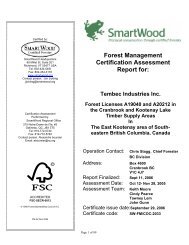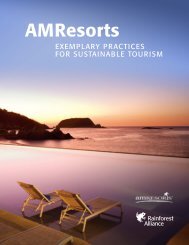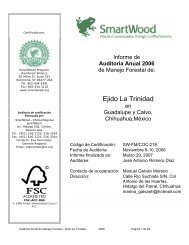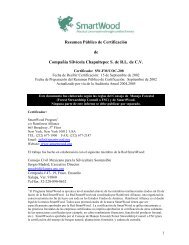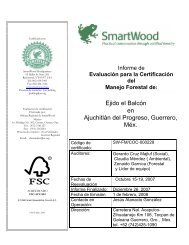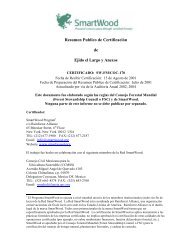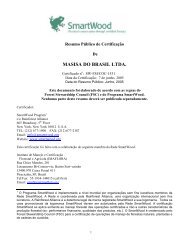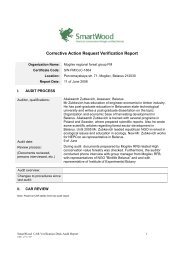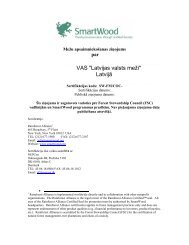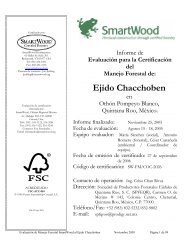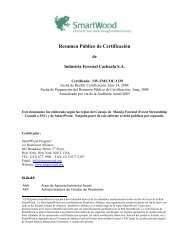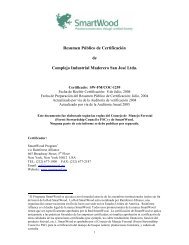Title: Rainforest Alliance/SmartWood Interim Standard for Assessing ...
Title: Rainforest Alliance/SmartWood Interim Standard for Assessing ...
Title: Rainforest Alliance/SmartWood Interim Standard for Assessing ...
You also want an ePaper? Increase the reach of your titles
YUMPU automatically turns print PDFs into web optimized ePapers that Google loves.
10.8 Appropriate to the scale and diversity of the operation, monitoring of plantations<br />
shall include regular assessment of potential on-site and off-site ecological and<br />
social impacts, (e.g. natural regeneration, effects on water resources and soil<br />
fertility, and impacts on local welfare and social well-being), in addition to those<br />
elements addressed in principles 8, 6 and 4. No species should be planted on a<br />
large scale until local trials and/or experience have shown that they are ecologically<br />
well-adapted to the site, are not invasive, and do not have significant negative<br />
ecological impacts on other ecosystems. Special attention will be paid to social<br />
issues of land acquisition <strong>for</strong> plantations, especially the protection of local rights of<br />
ownership, use or access.<br />
10.8.1 Monitoring shall include evaluation of potential onsite and off-site ecological and<br />
social impacts of plantation activities. (also see criterion 8.2)<br />
10.8.2 Applicable to SLIMF FMEs only (note: above indicator does not apply): FME<br />
shall document negative environmental or social impacts and design and<br />
implement measures to address the impacts.<br />
10.8.3 The purchase of lands or land leases <strong>for</strong> plantation establishment shall not<br />
adversely impact the community and/or resource use by local people.<br />
(Note: For exotic or invasive species issues, see Criterion 10.4.)<br />
10.9 Plantations established in areas converted from natural <strong>for</strong>ests after November<br />
1994 normally shall not qualify <strong>for</strong> certification. Certification may be allowed in<br />
circumstances where sufficient evidence is submitted to the certification body that<br />
the manager/owner is not responsible directly or indirectly of such conversion.<br />
10.9.1 The plantation shall not occupy land converted from natural <strong>for</strong>est since November<br />
1994, unless clear evidence exists that the current manager/owner was not<br />
responsible.<br />
10.9.2 Primary, degraded primary and mature secondary <strong>for</strong>ests, and threatened or<br />
endangered ecosystems should not be cleared or converted by current <strong>for</strong>est<br />
managers to create tree plantations.<br />
10.9.3 Where conversions after November 1994 have occurred, steps shall be taken that<br />
convincingly compensate <strong>for</strong> such conversions, based on interviews or other<br />
evidence gathered from other stakeholders and interested parties.<br />
(Note: See also Criterion 6.10.)<br />
<strong>SmartWood</strong> FM <strong>Interim</strong> <strong>Standard</strong> Indonesia 2008 Page 32 of 49



